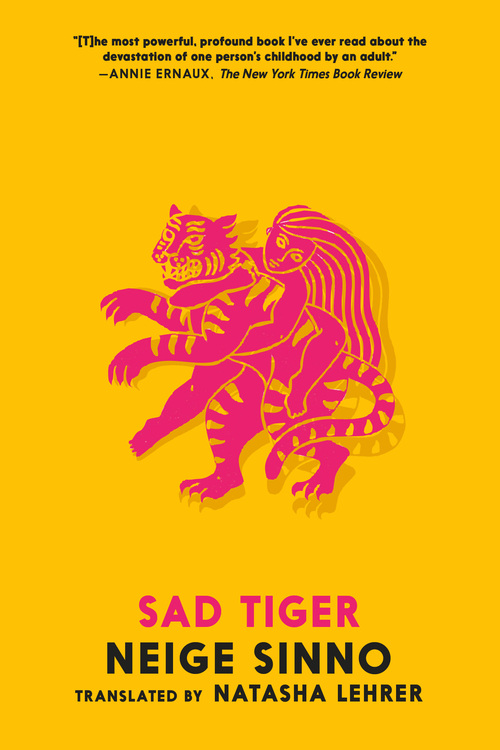Sad Tiger by Neige Sinno

Trigger warning: This review mentions rape and genocide.
To break through taboos can require a certain prowess. This prowess Neige Sinno has demonstrated twice. At age 19, she filed a lawsuit against her stepfather who sexually abused her from ages 7 til age 14. She filed again when she published Sad Tiger (now translated by Natasha Lehrer and published in the US by Seven Stories) the book that has emerged as the literary phenomenon of the fall of 2023 in France.
How did she craft this narrative and effectively approach such a deep-seated taboo? Sinno draws on her personal history, the many reverberations that this trauma had on her, on her family, and on her friends. Simultaneously, she investigates literary masterpieces in search of similar experiences. Like Maggie Nelson in The Argonauts, Sinno summons inspiration and fodder for dialogue from literary works by great authors that have sustained her own reflection (Virginia Woolf, Christine Angot, William Blake, Mary Gaitskill, Alejandra Pizarnik, Toni Morrison, and the list goes on) which is to say accounts of experiences that aim to annihilate the other, to deny his/her humanity.
Throughout this work, Sinno also skewers society for its inability to adequately address the problem of incest. Sinno’s father’s abusiveness is not just a symptom of his own moral failing, but that of society at large. Our society – the same one that reads Nabokov’s Lolita as the falling of a man manipulated by a depraved girl as opposed to the manipulative narrative of a child’s molester – is unable to define incest, Sinno posits.
And legal experts corroborate her claim. Incest is not a private affair, “it is a collective problem, a political problem, a public order problem, a public health problem even. Because when we limit incest to the private sphere, we allow ourselves to wash our hands of it,” Judge Durand stated in an interview with Elle Magazine. Sad Tiger is a book about a resistance, an act for which Neige Sinno won’t claim any glory, any sense of accomplishment. She is skeptical of the aura that surrounds the word ‘resilience.’ Neige Sinno doesn’t believe in pardon or resilience, or in the redeeming power of literature. She has no intention to offer miraculous remedies.
Instead, she explores her own understanding of humanity. Musing on concepts evoked in Robert Antelme’s The Human Race, which explores whether the Holocaust perpetrators maintained any aspect of their humanity, Sinno expresses her excruciating and controversial position that to fully deny humanity in the Other would be to also deny humanity in herself, and thus is impossible.
Reading Sad Tiger, we feel very deeply that Sinno lives on borrowed time, every day being a renewed fight to not stumble. In this unparalleled work that contains a thousand questions, a thousand turnarounds, one sees one constant concern: how can one
protect others from rape, from incest? In the midst of so much darkness, an answer reads crystal clear: by speaking up and asking questions.
Sad Tiger by Neige Sinno, P.O.L.
Click here to purchase this book with us.
To read further:
“Triste Tigre” de Neige Sinno : pourquoi il faut lire ce livre | Les Inrocks
Entre autobiographie et essai, l’autrice raconte le viol qu’elle a subi de 7 à 14 ans, et l’onde de choc que ce crime a provoquée sur toute sa vie. Un livre-événement et une voix littéraire à découvrir d’urgence.
DIACRITIKNeige Sinno : ” Je voudrais que MeToo soit avant tout une exploration de nos ambivalences ” (Triste Tigre)
Avec Triste Tigre, Neige Sinno s’impose comme l’une des révélations de cette rentrée. Véritable déflagration, son livre qui interroge le viol que le beau-père a fait subir à l’autrice durant son enfance, mobilise une rare puissance de diction et un saisissant pouvoir d’intellection des faits. Approcher la figure du violeur en la questionnant socialement depuis…
” Triste tigre “, de Neige Sinno : le feuilleton littéraire de Tiphaine Samoyault
CHRONIQUE. Notre feuilletoniste a lu ce premier livre, dans lequel l’autrice écrit sur les viols répétés commis sur elle par son beau-père dans son enfance. Un livre qui tremble de partout.


